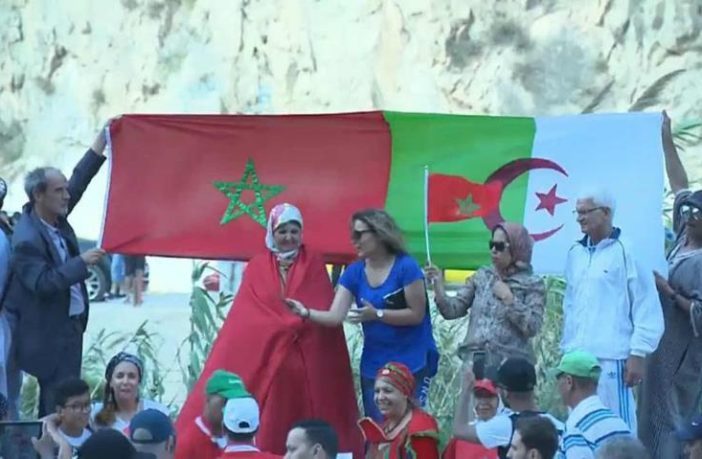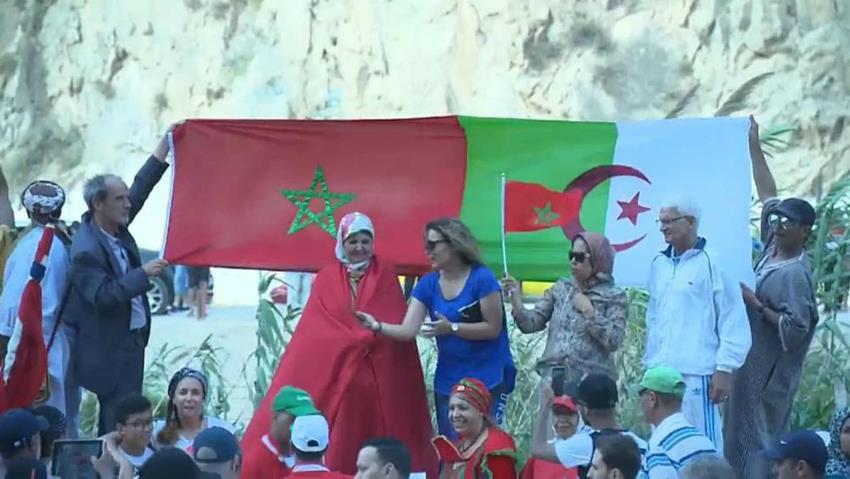Mustapha El Bouabi
More footage of exuberant celebrations at the frontiers resurfaced after Algeria’s historical win of the cup last Friday, with hundreds of Moroccans and Algerians chorusing “one, two, three, viva l’Algerie”, accompanied by calls to open the border, which has been closed since 1994.
The Algerian-Moroccan border had been closed in the wake of a series of conflicts between the two countries, mainly over the issue of Western Sahara, which Morocco considers its southern territories whereas Algeria supports its self-rule under Polisario Front’s administration, advocating its recognition as an independent territory.
Before the closure, Algeria had been accusing Morocco of backing “Islamists and terrorists” in its country. The final tipping point came, as it turned out, after the 1994 Marrakech attack, in which two Spanish tourists were shot dead, and Rabat accused Algiers of having had a hand in the assault.
With this, Morocco imposed visas on Algerian travellers to Morocco and Algeria reciprocated with closure of the border in the same year in protest of Rabat’s measures.
 |
These recent African Cup celebrations served as a reminder to politicians on both sides of the divide to rethink their policy regarding the border situation |  |
While Algerians and Moroccans can now again travel to either country without visa, they only can do so via two main entry points and only by plane.
However, neither Algerians nor Moroccans can cross directly on foot or by car, anywhere along the 1,559 km long border their countries share.
These recent African Cup celebrations served as a reminder to politicians on both sides of the divide to rethink their policy regarding the border situation.
Read also: Lakhdar Brahimi calls for Algeria-Morocco borders to be reopened
Friday’s transborder celebrations were not unprecedented, as many Algerians and Moroccans, whose extended families live just a stone’s throw of each other across the divide, occasionally assemble on both sides of the border in order to see and greet their relatives.
Families who only live a short walk or drive away from one another, are forced to endure the agony and considerable cost of long journeys, if they want to visit their family members on the other side.
If they want to attend a family wedding or a funeral, they are forced to fly from Casablanca to Oran, then travel inland to the Algerian side of the border, or vice versa travelling to Oujda, then to the Moroccan side of the partition. This is especially hard on poorer families who cannot afford the flights as well as on those who are too old, frail or sick to undertake such long, arduous journeys.
One of the participants in the recent celebrations at the border, Oualid Kebir, an Algerian blogger and activist living in Morocco close to the border, tells The New Arab: “People are subjected to gratuitous and unjustifiable punishment that has lasted for far too long. I consider this a tragedy and a violation of the human right to move freely and visit your relatives.
“For some time already I have been appealing for a solution to be found for these families by opening some pedestrian crossings to help them overcome these difficult humanitarian problems and end their emotional suffering.”
Last year, Moroccan and Algerian activists organised a joint protest at the former border crossing point Zouj Bghal, calling on politicians to put aside their differences and focus on what the two nations share in common, including history, religion, traditions, cuisine, and languages.
Kebir says: “Our message to the Moroccan and Algerian governments is clear – it is an appeal. Firstly, the necessity to gradually resolve issues, starting with the humanitarian suffering of Algerian and Moroccan families by providing a special humanitarian crossing, readdressing all the outstanding issues and thinking pragmatically in a way that benefit the two countries.
“This could be the actual beginning of a united Maghreb that can achieve prosperity, wealth and peace for the two peoples.”
 |
This could be the actual beginning of a united Maghreb that can achieve prosperity, wealth and peace for the two peoples |  |
The border closure between Morocco and Algeria not only takes its toll on family relationships but also on the economy of both countries and within the wider region of the Maghreb.
It not only prevents families and communities from coming together, but also impedes and restricts trade between the neighbouring countries.
According to economists’ estimates, both countries are suffering a loss of two percent of their economic growth rates.
However, the ramifications of it are felt even further afield, affecting trade across all Maghreb Union countries, including Tunisia, Libya, and Mauritania.
The International Monetary Fund (IMF) estimates losses to the Maghreb Union of around $16 billion annually due to the very limited intra-regional trade between the member states.
With intra-regional trade only representing three percent of the total trade of these countries, the Maghreb region is the least integrated region in the world.
 |
With intra-regional trade only representing three percent of the total trade of these countries, the Maghreb region is the least integrated region in the world |  |
During the meetings of leaders of the Arab Maghreb Union (AMU) in February this year for the 30-year anniversary of the trade organisation’s founding, the AMU received a grant from the African Development Bank to modernise the integrated railway network between Morocco, Algeria and Tunisia.
If the plan goes ahead, it will allow more than 36,000 passengers to travel between Algeria and Morocco per day and the daily transport of more than 22,000 tonnes of merchandise.
This would be an enormous economic gain for both Morocco and Algeria and help increase employment while seeing a notable decrease in poverty rates for their populations.
Read also: Morocco to demolish childhood home of Algeria’s president Bouteflika
As long as the border between the two countries remains closed, none of this will come to fruition meaning the ordinary people of these nations continue to suffer the consequences.
These are the very same people who feel no animosity against each other, who yearn to be free to travel and to celebrate together, as they did after Algeria’s triumph at the Africa Cup last Friday, singing and chanting together across a hostile border.
 |
These are the very same people who feel no animosity against each other, who yearn to be free to travel and to celebrate together, as they did after Algeria’s triumph at the Africa Cup last Friday, singing and chanting together across a hostile border |  |
“I consider Moroccans’ happiness with the Algerian national team’s victory a token of love and an honest expression of love from Moroccans towards the Algerian people,” says Kebir.
“This euphoria, I witnessed, confirms the strong links between our people. I personally see Moroccans as the closest to Algerians.”
He mournfully adds “But when I remembered those wires and trenches and closed border points, I was hurting and lamented our circumstances as two groups of people who love each other, but whose politicians’ mistakes have made them live in deprivation for more than a quarter of a century, especially in terms of the humanitarian aspect.”
Mustapha El Bouabi is a journalist at The New Arab.






![A soldier stands on the Algerian side of the Algeria-Morocco border, near Tlemcen, at a border post in the Marsat Ben M'Hidi region, on July 14, 2011 [Getty]](http://www.moroccotomorrow.org/wp-content/uploads/2019/07/Morocco-148.jpg)


